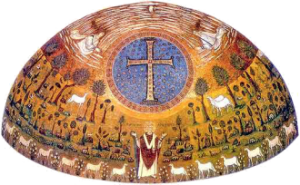Resources

News

Library
Greetings in our Lord and Savior Jesus Christ!
The Orthodox Fellowship of the Transfiguration exists to hallow God’s Name ‘on earth as it is in heaven’ by seeking the transfiguration of creation through the activation of the Christian calling toward transfigured life.
The transfigured life toward which all Christians, indeed, all human beings, are called by the incarnate Logos, can only be approached and lived in sacramental harmony and partnership with all creation. This is so because created being—every created entity called out of nothing by God–participates in God’s eternal providence and purpose, each thing at its own level, through the Incarnate Lord Jesus Christ, who as the Divine Logos-Word, is the ground and goal of the individual logos-word, or image, of each created thing, whether rock, plant, animal, human or angel.
entiality, temples of the Holy Spirit.

As temples of the Holy Spirit, our bodies themselves are meant to be transfigured by the indwelling Trinity. As our bodies are coterminous with the material creation, physical “microcosms,” says St. Gregory of Nyssa, of the macrocosmic universe, creation itself in all its physical-bodily existence is meant to be transfigured in and through our personal and corporate transfiguration in and through the Body of Christ.
All sin is disfiguration, an unnatural movement away from God and toward non-being and death, because God is the source of true being and life. Sin is not restricted to the individual moral domain, but has an inescapable cosmological and hence planetary dimension, as is confirmed by Scripture (Romans 8:19-28) because our bodies are interdependent with the natural world in all its physical laws, complexity and harmony. Thus the state of the natural world cannot but mirror our collective spiritual state as human beings.
The profound disfiguration, disharmony and environmental destruction that are now “everywhere present” as sacrilegious “graffiti” on the cosmic holy temple of the earth can only be cleansed and eliminated by our cleansing of our personal temples and eliminating the sinful causes of ecological destruction in our souls and bodies and the social and economic structures that support and sustain those sinful causes. When we commit totally to making our bodies and souls fit temples of the Holy Spirit, our thoughts, feelings and actions become life-enhancing, earth-healing and death-destroying according to the Divine pattern established once and for all by the life, death and resurrection of the Incarnate Christ Himself.
The sacraments, universally and holistically understood, and participated by Christians according to the virtues and practices aimed at deification, are the means by which we are incorporated fully within the Body of Christ, and will lead, as the Church believes, to the transfiguration of ourselves, the earth, and all creation.
In the context of the liturgical life of the Orthodox Church, the Fellowship seeks to extend the transfiguring activity of the sacraments into all creation through ascetic practice, the keeping of the commandments, and the acquisition of virtue, thus opening the way to the God-willed and grace-filled restoration of the beauty and integrityof God’s earthy temple.
The Lord Fills All Creation with His Presence
The Lord suffuses all of creation with His Divine presence in one continuous legato from the substance of the atoms to the Mind of God. Let us renew the harmony between heaven and earth, and transfigure every detail, every particle of life. Let us love one another, and lovingly learn from one another, for the edification of God’s people, for the sanctification of God’s creation, and for the glorification of God’s most holy Name.
~ His All-Holiness Ecumenical Patriarch Bartholomew. Presentation to Metropolitan Nikitas of Hong Kong, in Manila, The Philippines, February, 2000
Transfiguration or Disfiguration
If nature is not transfigured, she becomes disfigured. Today we are threatened by barbarism and by the suicide of all mankind. By barbarism… [I mean] the transformation of technology into destiny…, into an inevitable, death-like fatality. The fatality of doing all that we can, without first questioning the consequences…. As for the suicide of mankind, we are beginning to realize that it is possible, what with Chernobyl and the determination of the great financial organizations to destroy the forests of the Amazon….
Only the highest of forces, that of the spirit, and then that of spirit united with the heart, to use the language of the Orthodox tradition, can face up to the challenge of technology.
Asceticism is necessary in order to fight against the instinct of possession, of blind power and a flight into hedonism….
Asceticism is therefore indispensable if we are to achieve that limitation of needs which will make it possible for us both to respect better the earth, its rhythms and the life which belongs to it, and to bring into operation the necessary sharing on a planetary scale.
~ His Beatitude Patriarch +Ignatius IV of Antioch. Federation of Swiss Protestant Churches, March 12, 1989, Lucerne, Switzerland, official translation by Patriciia Krueger for the OFT, Santa Rosa, CA, official translation by the OFT for HB, Santa Rosa, CA 95407, §14-15
Creation’s Transfiguration and the Sacraments
Nicholas Zernov describes the differences between the understanding of the Holy Eucharist in the East and in the West which reflect, he says, fundamental differences in cosmology. Because this deals with differences in worldview, this shapes how one sees the environment, which gives this passage ecological relevance.
Zernov says that in the West (referring to the theological understanding of the Roman Catholic Church) the Body of Christ in the Eucharist is seen as God coming down from heaven in the process of transubstantiation, and Christ taking form within the blessed host. This reflects the way Christ and creation are understood.
In the East, the mysteries of the Divine Life are set in a timeless reality. The words of Christ at the Last Supper are repeated and gradually the Divine Presence is revealed in the metamorphosis or transfiguration of the bread and wine of the Eucharist into the Body and Blood of Christ. During the Divine Sacrifice, streams of Divine Grace flood into the world. Heaven and earth, Infinite and finite, Uncreated and created, God and man come together and become one, or rather, their already existing unity is realized. The Eucharist, for an Orthodox Christian, is not so much a sudden intervention from above, as a gradual revelation of the divine presence which is always here.
~ Nicholas Zernov, The Church of the Eastern Christians, SPCK Publ., London, 1947
The Spirit of Fasting
We need to recover, with a view to the transfiguration of nature, the three traditional forms of asceticism: fasting, chastity and vigilance. …
Fasting, that is to say the voluntary limitation of one’s requirements, makes it possible for us, at least in part, to free desire, so that it can recover its original character as desire for God and love of neighbor. … The spirit of fasting, which today should be diffused throughout the whole of our civilization, involves a change from an exploitive relationship with nature to one which is modeled on the Eucharist.
Furthermore, tradition tells us that fasting is inseparable from mercy and sharing. The Fathers have underlined that material elements pass continuously from one body to another, and that the universe is therefore in fact but a single body…. That is why, for them, the earth belongs only to God; men are only its managers, and the products of man’s activity, in a prolongation of eucharistic sharing and in a spirit of fasting, should be the subject of a beneficent circulation, a just distribution. A cosmology of transfiguration is thus inseparable from a sociology of communion, which has continuously to be invented anew in the concrete circumstances of history.
It is in a spirit of fasting and with a profound sympathy for nature and our brethren… that Christians have to face up to the absurdity of the present situation, in which publicity multiplies the false needs of some while others are dying of hunger, and where chemistry and biology overstimulate the earth in one place while elsewhere the desert expands….
~ His Beatitude Patriarch +Ignatius IV of Antioch. “The Spirituality of the Creation,” Lecture to the Federation of Swiss Protestant Churches, March 11, 1989, Lausanne, Switzerland, official translation for HB by the OFT, Santa Rosa, CA 95407, § 29-30
Human Purpose is to Transfigure the World
Man is not a being isolated from the rest of creation. By his very nature, he is bound up with the whole of the universe…. In his way to union with God, man in no way leaves creatures aside, but gathers together in his love the whole cosmos disordered by sin, that it may be transfigured by grace.
~ St. Maximos the Confessor. Questions to Thalassios Nr 191-192
Sacred Cosmology in the Christian Tradition
Liturgy, in its authentically Orthodox sense, is the transfiguration of nature (not just human nature but all nature) through the living symbolism of the sacramental act, which unites man and woman, this present world and paradise, earth and heaven, the sensible and intelligible dimensions of creation in its totality, and, ultimately, the Creation and the Uncreated.
In the conception of St. Maximos, which is the view of ancient traditional Christianity, the liturgy is the Divinely-ordained work of the people in which the essence of religion and science is fully embedded in the cosmos because the cosmos is fully embedded in God. Through such liturgy, both the universe as macrocosm and the individual human being as microcosm are transformed, transfigured and deified. This transfiguration and deification is the ultimate destiny of both cosmos and man. Liturgy as sacred cosmology in action is able to accomplish this because of its essence; the communication of and communion with the Archetypal Sacrifice; the very foundation of the universe.
~ Vincent Rossi. Saint Sophia Greek Orthodox Cathedral Website. Daily Meditation for July 12, 2013
